


The episode to introduce Eli (Danny O'Dea), a kind of real-life Mr. Magoo who would go on to appear in 70% of the episodes between this and 2002's A Brief Excursion in the Fast Lane. It's perhaps the only element of the episode that really makes it stand out in any way, as this is very much "Summer Wine by numbers", and is full of the usual ferrets, Nora Batty ruminations and so on.
Seymour creates an invention that actually works (at least until right at the end of the credits) which is curiously flat and uninvolving. Yet, invention aside, Seymour's lines in this one are very Foggyesque, almost as if it was a script written some time beforehand and dusted off, just the names changed. Despite the lack of real inspiration, however, it's a pleasant enough watch.
Lastly, there's the extensive shots, as pictured, of a topless calendar that Compo takes particular delight in, and Clegg gets nervous of. Going out to a family audience at 7:15pm on a Sunday night, it's not "PC" to question this element... even at the time, the notion of having pictures of half-naked women in public places seemed an incredibly strange part of society.
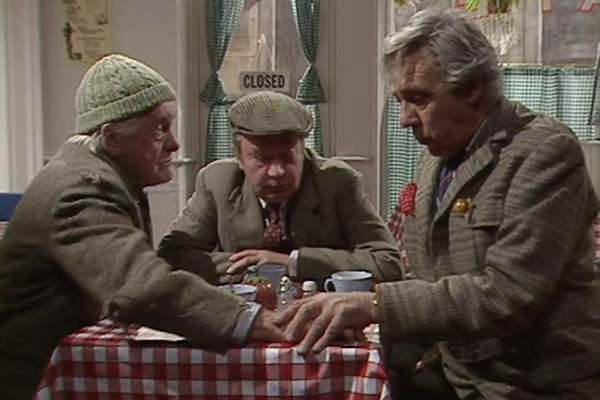
A storyline about Compo having squeaky boots and the need to build a macho-looking purse are quite infantile things to build an episode around, even for this show, yet they're just containers for a gentle, reflective episode. It doesn't hurt that this is just one of four episodes this series that doesn't feature Howard and some combination of Pearl and/or Marina... a one-joke character that had already outstayed his welcome, but would continue until the show's demise.
There's some nice material for Michael Aldridge in this episode, including the revelation that his house is full of children's class furniture, and the lovely twee "there's no need to take the wee wee." There's also a line of dialogue which implies that Seymour may have known Compo from school, which contradicts them being introduced to him in Uncle of the Bride, but does fit with events in the following years' sister series First of the Summer Wine (1988-1989), where young versions of all three regulars are seen together.
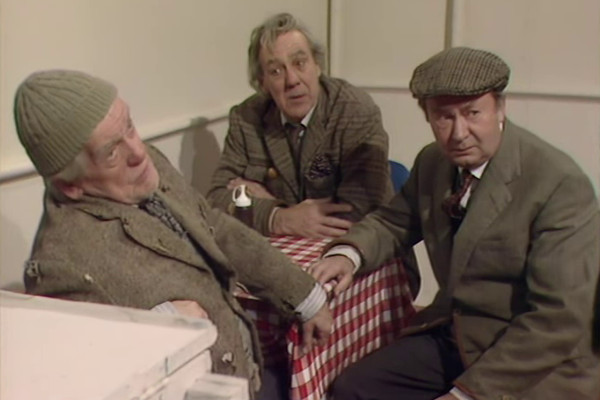
An episode ostensibly centred around Edie (Thora Hird), a kind of proto-Hyacinth Bucket, who insists on talking in a "posh" voice whenever there's the chance that strangers may hear. Hird became one of the series' regular characters, appearing in all but ten of the episodes from Uncle of the Bride until the end of series 24, the final episode of which went out the day after she'd died in March 2003.
Yet while the big whoops from the audience come from a succession of stunt men in a fast car juxtaposed with the cast on bluescreen as "terrified passengers", the real standout bits come in the quieter moments. There's some nice philosophical dialogue, such as Clegg musing that "When they used to call people things like 'Herbert', it helped enormously to keep them steady in face of the world's growing tendency to be ridiculous."
There's also retroactively poignant scenes of Nora looking everywhere for the missing Wally, before pretending she hadn't felt his absence. Although he'd still appear in two more episodes, Joe Gladwin was noticeably frail in this series, and passed away three days after this episode aired, aged 81. Throughout these articles, very little has been said about Gladwin, simply because there's not always room in micro-reviews to talk about everything. But while a lot of the supporting characters in LOTSW can be, frankly, tedious, Joe Gladwin always showed immense skill with his timing and delivery, and there's a very real argument to be had that he was the most skilled performer in the entire programme.
Lastly, a point of trivia is that the "fourth wall" of the cafe is shown clearly, as illustrated in the screenshot above. It's slightly disconcerting, as the spacial dynamics of the cafe suggest that the table is in the centre of the cafe, not against a wall. The same effect is seen briefly as Seymour speaks to Milburn in Set The People Free, but far less prominently, as there does appear to be the illusion of some space. Like with old time movies where cameras would pass through the space of where walls should exist, this is an oddly unsettling quirk of the programme, showing Compo jammed up against a wall when normally we see him from the other side of the table, and at a distance of several feet.
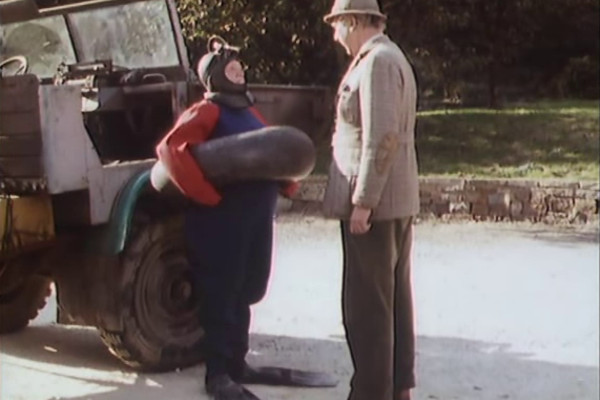
The reason for the first double-page article on the programme is that, for the first time, a Last of the Summer Wine series was given an extra-long run. While some of the earlier series may have been given an extra episode here and there (series four has eight, for example), for the first eight series and twelve years of its run, Last of the Summer Wine was a 6-7 episode programme, specials notwithstanding.
With no series in 1986, and Seymour introduced in two consecutive specials, broadcast a year apart, there's the possibility that this was intended to run as two separate series. Certainly, the idea of regular "extended length" series wasn't immediately considered, as the show went back to its usual length for the following two years.
Foggy's return in 1990 saw an increase to ten regular series episodes, but this was again brought back to just half a dozen the following year. However, from series 14-16 (1992-1995) it became a nine episode show; from series 17-30 (1995-2009) it was averaging ten episodes a series. Only when the programme was finally given the axe in 2010 did it return to six episodes.
All of which statistical rambling leads us to series 9, the longest of them all with a dozen regular episodes. The Heavily Reinforced Bottom is light-hearted and fun, but isn't an episode that really justifies the additional instalments, or particularly breaks the mould, following a canoeing theme explored in series two's Ballad for Wind Instruments and Canoe. However, that probably meant little to viewers, as that particular episode was over a decade old at this stage, and, presumably as it featured a different "third man" in Blamire, hadn't been repeated.
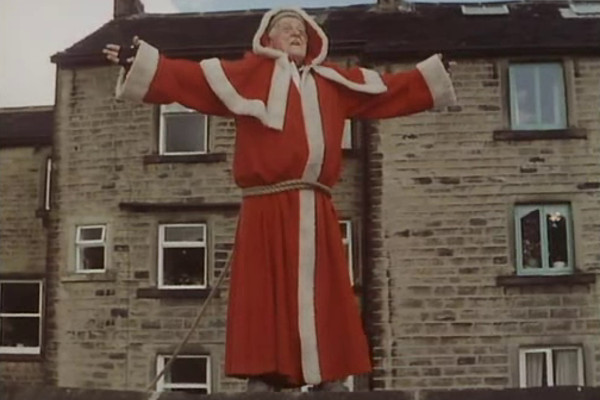
As discussed in Uncle Of The Bride, the character of Seymour was initially an odd creation... a quite aloof, bullying character who wasn't particularly likeable, in direct contrast to the man who played him.
This seems to be consolidated here, with a 1986 Christmas special that aired just ahead of the new series. As there would be over a year between the broadcast of Uncle Of The Bride and series nine proper, it was perhaps easier for Roy Clarke to refine the character and set right what didn't work the first time around. Seymour never became the classic character that Foggy was, but he was warmer and quite sweet-natured... eventually, anyway.
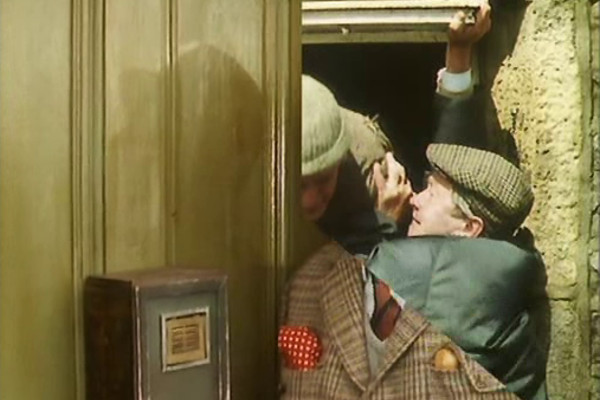
In many ways, Set The People Free is the ideal format for a Last of the Summer Wine episode... leisurely, meandering, and without excessive need for a plot. There is a basic storyline, in terms of the trio wanting to give Howard and Wally a taste of freedom for an afternoon, but it just acts as a backdrop to a gentler-paced narrative. However, if the programme seems to be missing the teeth that it had in earlier series, then there's still a mention of contraceptives, just to make sure the family audience knew it still had some edges.
Alan Bell's film-based direction sees many impressive set ups gone into making what is, after all, just a half-hour Sunday sitcom. Last of the Summer Wine perhaps got suffocated in its own long reputation, so it's easy to overlook the care gone into all the aerial shots and stunt work. Less impressive is a transition of time passing - two, in fact - which, as with Who's Feeling Ejected Then?, Jaws and Edie and the Automobile, where it also occurs, brings to mind something like Star Wars rather than a family comedy series. This very odd effect is shown in the image above.
Speaking of transition points, it's very obvious that when Compo hides behind a wall and walks off into the distance, luring Nora away, that the Compo who runs is a double, and that Bill Owen has stood hidden the entire time. But such moments are trivial distractions to a pleasant half an hour's viewing filled without malice or bad intent.
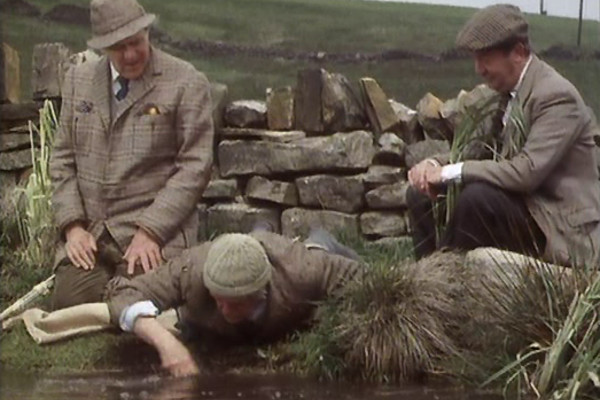
A nice episode that finally makes pains to really establish Seymour as part of the gang, after what was such a shaky start. Here he finally acknowledges that Compo and Clegg are his "friends", and for possibly the first time Seymour and Compo are in agreement over something, as Clegg goes off on one of his tangents and both want him to be silent. There's even an invention of Seymour's - a kind of proto-Alexa for opening doors - that is actually useful. At least, it would be if it worked.
Roy Clarke at his best is able to get around four minutes of material featuring Compo and Clegg just emptying their pockets and discussing the contents, in a diversion from the plot. A lot of early LOTSW episodes were, in effect, plotless, and it's a fine tradition to return to. Also significant is that the programme has now been on the air for so long that one of the reminisces takes place during the programme's lifespan. Whereas previous anecdotes have concerned their childhood, Compo and Clegg tell Seymour about events during a "long hot summer", which is clearly the summer of 1976. The events described were never shown on screen, and would have occurred in the gap between series two and three.
Less impressive is the episode's payoff, which sees various characters all turn up in contrived and unlikely circumstances just to get Compo on some device. Thankfully it isn't crucial to the episode, and, while said device does go up a hill, we don't see it going down one. A special pay off is an extra joke right at the end of the credits.
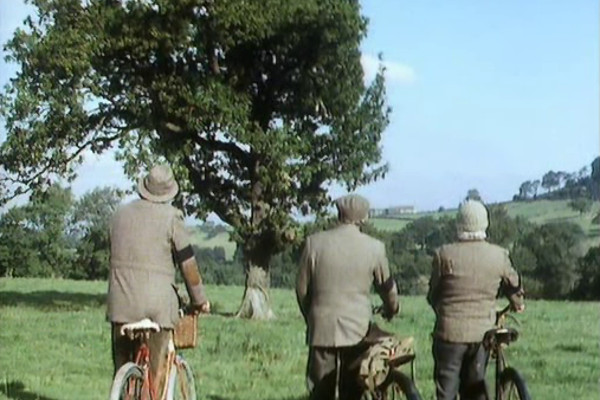
This was the 76th instalment of Last of the Summer Wine, and it's quite natural that any writer would depend upon formula and short cuts to get episodes completed, especially in a longer run like this one. However, with the final episode of the 9th series, it's as if Roy Clarke not only saved all his best material, but also remembered what the programme was supposed to be about.
Clegg learns of the death of an old school friend, Bill Henry Duffy, and the wistful script sees the central trio try to complete a tour of three pubs in his memory, and the memory of their childhood. There's still the odd stunt, but it's gentler, and tied directly into the narrative rather than feeling bolted on for a cheap laugh. With some great lines, there are multiple occasions throughout where the cast are clearly struggling to keep a straight face, and are relishing the higher quality of material, rather than understandably going through the motions.
As the final appearance of Joe Gladwin, it's nice that he got to go out with some of Clarke's best lines, musing that "they say America's the land of opportunity. He'd have never have fallen out of an aeroplane round 'ere." There's also his plaintive cry to Nora when she states she could never marry a German: "You didn't even try!"